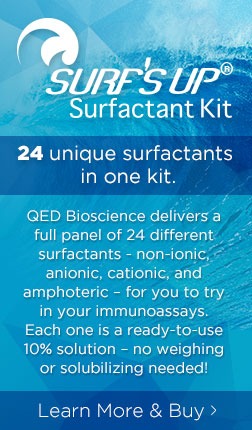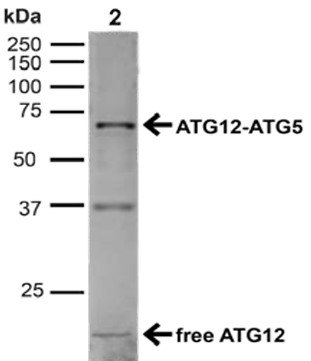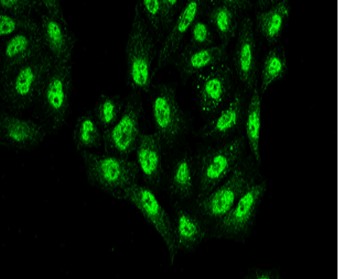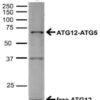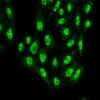Anti-Atg12 Antibody (23007)
$466.00
SKU: 23007
Categories: Antibody Products, Autophagy Antibodies, Products
Overview
Product Name Anti-Atg12 Antibody (23007)
Description Anti-Atg12 Rabbit Polyclonal Antibody
Target Atg12
Species Reactivity Human
Applications WB,ICC/IF
Host Rabbit
Clonality Polyclonal
Immunogen Synthetic peptide corresponding to amino acids at the C-terminus of human Atg12.
Properties
Form Liquid
Concentration 1.0 mg/mL
Formulation PBS, pH 7.4, 50% glycerol, 0.09% sodium azide.Concentration: 1mg/ml
Buffer Formulation Phosphate Buffered Saline
Buffer pH pH 7.4
Buffer Anti-Microbial 0.09% Sodium Azide
Buffer Cryopreservative 50% Glycerol
Format Purified
Purification Purified by peptide immuno-affinity chromatography
Specificity Information
Specificity This antibody recognizes human Atg12.
Target Name Ubiquitin-like protein ATG12
Target ID Atg12
Uniprot ID O94817
Alternative Names Autophagy-related protein 12, APG12-like
Gene Name ATG12
Sequence Location Cytoplasm, Preautophagosomal structure membrane
Biological Function Ubiquitin-like protein involved in autophagy vesicles formation. Conjugation with ATG5 through a ubiquitin-like conjugating system involving also ATG7 as an E1-like activating enzyme and ATG10 as an E2-like conjugating enzyme, is essential for its function. The ATG12-ATG5 conjugate acts as an E3-like enzyme which is required for lipidation of ATG8 family proteins and their association to the vesicle membranes. {PubMed:12207896, PubMed:17999726, PubMed:19074260, PubMed:19164948, PubMed:23202584}.; (Microbial infection) May act as a proviral factor. In association with ATG5, negatively regulates the innate antiviral immune response by impairing the type I IFN production pathway upon vesicular stomatitis virus (VSV) infection (PubMed:17709747). Required for the translation of incoming hepatitis C virus (HCV) RNA and, thereby, for the initiation of HCV replication, but not required once infection is established (PubMed:19666601). {PubMed:17709747, PubMed:19666601}.
Research Areas Autophagy
Background Autophagy is a catabolic process that results in the degradation of bulk cytoplasmic contents within autophagosomes and lysosomes. Atg12 is an ubiquitin-like protein involved in autophagy vesicle formation. Conjugation with Atg5 through a ubiquitin-like conjugating system involving also Atg7 as an E1-like activating enzyme and Atg10 as an E2-like conjugating enzyme, is essential for its function. The Atg12-Atg5 conjugate acts as an E3-like enzyme which is required for lipidation of Atg8 family proteins and their association to vesicle membranes. The Atg12-Atg5 conjugate also negatively regulates the innate antiviral immune response by blocking the type I IFN production pathway through direct association with RARRES3 and MAVS.
Application Images



Description Immunoblotting: use at 1-2ug/ml. Bands of ~55kDa, corresponding to Atg12-Atg5 complex, and ~15kda, corresponding to free Atg12, are detected. Detection of Atg12 and Atg5- Atg12 in 20ug of HeLa cell lysate.

Description Immunofluorescence: use at 10ug/ml. Detection of Atg12 in formaldehyde-fixed HeLa cells.
Handling
Storage This antibody is stable for at least one (1) year at -20°C.
Dilution Instructions Dilute in PBS or medium that is identical to that used in the assay system.
Application Instructions Immunoblotting: use at 1-2ug/mL. Bands of ~55kDa, corresponding to Atg12-Atg5 complex, and ~15kda, corresponding to free Atg12, are detected.
Immunofluorescence: use at 10ug/mL.
These are recommended concentrations.
Endusers should determine optimal concentrations for their applications.
Immunofluorescence: use at 10ug/mL.
These are recommended concentrations.
Endusers should determine optimal concentrations for their applications.
References & Data Sheet
Data Sheet  Download PDF Data Sheet
Download PDF Data Sheet
 Download PDF Data Sheet
Download PDF Data Sheet
